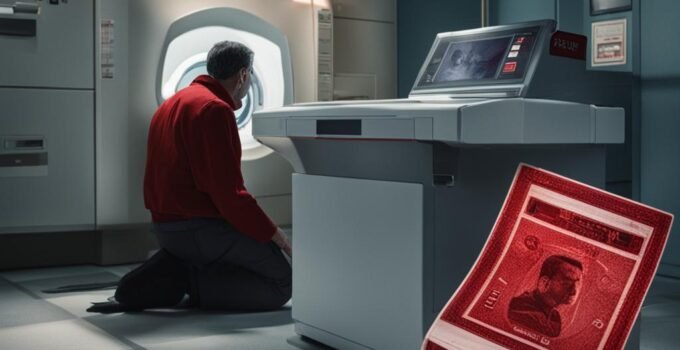Welcome to our article on the perplexing issue of insurance denials for PET scans. In recent years, many individuals have faced the frustration of having their claims for this vital medical procedure denied by insurance companies. Today, we aim to shed light on the reasons behind these denials and explore the implications for patients seeking proper medical care.
Key Takeaways:
- Insurance companies like Cigna have been denying claims for PET scans, deeming them as “not medically necessary.”
- Critics question the fairness and legality of the denial process, prompting calls for further investigation.
- PET scans play a crucial role in medical diagnosis and treatment, providing valuable information for doctors.
- Insurance denials can result in financial strain and delay in diagnosis or treatment for patients.
- Patients have the right to appeal insurance denials and access consumer assistance programs.
As we delve into this topic, we invite you to explore the complexities surrounding insurance denials for PET scans and the potential impact on individuals seeking essential medical care. Let us navigate this intricate landscape together and shed light on the need for transparency and reform in the insurance claims process.
The Importance of PET Scans in Medical Diagnosis and Treatment
PET scans, or Positron Emission Tomography scans, are valuable imaging tests used in medical diagnosis and treatment. They can detect diseases and conditions on a cellular level, providing crucial information for doctors to determine the best course of action. Unlike other imaging techniques, such as X-rays or CT scans, PET scans can show how organs and tissues are functioning, rather than just their structure.
One of the key benefits of PET scans is their ability to identify metabolic activity in the body. This means that they can detect changes at a molecular level, often before structural changes can be observed. This is particularly important in the early detection and monitoring of diseases such as cancer, where catching changes at an early stage can significantly improve treatment outcomes.
PET scans are also used in the evaluation of various neurological conditions, such as Alzheimer’s disease or epilepsy. By assessing brain metabolism, PET scans can assist in diagnosing and monitoring these conditions, providing valuable insights into disease progression and treatment effectiveness.
Despite the importance of PET scans in medical care, insurance companies like Cigna often deny coverage for these tests. They cite reasons such as lack of medical necessity or alternative imaging options. This leaves patients with the burden of paying for these necessary tests out of pocket, potentially leading to financial strain and delayed diagnosis or treatment.
The Impact of PET Scan Denials on Patients
The denial of insurance coverage for PET scans can have a significant impact on patients. Not only are they faced with unexpected financial burdens, but they may also experience delays in receiving crucial diagnosis and treatment. These delays can potentially affect the effectiveness of medical interventions and impact overall health outcomes.
Furthermore, the denial of insurance coverage for PET scans can cause emotional distress for patients, who may feel frustrated and hopeless in their pursuit of proper medical care. It is important for individuals facing insurance denials to be aware of their rights and advocate for the coverage they need.
If you have been denied insurance coverage for a PET scan, it is essential to understand your options and take appropriate action. Stay informed about your rights, consider appealing the denial, and seek support from consumer assistance programs. By advocating for insurance coverage, you can help ensure that necessary medical procedures like PET scans are accessible to all who need them.
Common Reasons for Insurance Denial of PET Scans
Insurance companies frequently deny coverage for PET scans, citing various reasons that may seem unreasonable to patients. Understanding these common reasons can help patients navigate the insurance claims process more effectively. Below are some of the key factors that contribute to the denial of insurance coverage for PET scans:
- Lack of medical necessity: Insurance companies often require a strong justification for the medical necessity of a PET scan. They may argue that alternative diagnostic tests or treatments are more appropriate or cost-effective.
- Non-coverage for pre-existing conditions: If the condition being evaluated by the PET scan is deemed pre-existing, insurance companies may deny coverage based on the assumption that the scan is not required for a new diagnosis or treatment plan.
- Out-of-network providers: Insurance policies typically have network restrictions, and if a PET scan is performed by an out-of-network provider, coverage may be denied or limited. Patients should verify the network status of their healthcare providers before undergoing a PET scan.
- Incomplete or missing documentation: Insurance companies require comprehensive documentation to support the medical necessity of a PET scan. If any required information is missing or incomplete, it can lead to denial of coverage.
It is important for patients to be aware of these common reasons for insurance denial of PET scans and to be proactive in addressing them. Patients can work closely with their healthcare providers to ensure that all necessary documentation is submitted and to explore alternative coverage options if needed.
Table: Comparison of Insurance Denial Reasons for PET Scans
| Reasons for Insurance Denial | Description |
|---|---|
| Lack of medical necessity | Insurance companies may require stronger justification or alternative diagnostic options. |
| Pre-existing conditions | PET scans may be denied if the condition is deemed pre-existing. |
| Out-of-network providers | Denial of coverage if the PET scan is performed by an out-of-network provider. |
| Incomplete or missing documentation | Denial due to inadequate or incomplete information provided by healthcare providers. |
In summary, insurance denials for PET scans are primarily attributed to factors such as lack of medical necessity, pre-existing conditions, out-of-network providers, and incomplete documentation. Patients should be proactive in addressing these reasons by working closely with their healthcare providers and seeking alternative coverage options when necessary. By understanding the common reasons for denial, patients can navigate the insurance claims process more effectively and potentially secure coverage for their essential PET scans.
The Impact of Insurance Denial on Patients
When insurance companies deny coverage for a PET scan, it can have a significant impact on patients. They may be left with hefty medical bills, placing financial strain on individuals and their families. Additionally, delays in receiving a PET scan can delay diagnosis or treatment, potentially impacting the patient’s health outcomes. This can be especially frustrating for individuals who have followed proper procedures and believe that a PET scan is vital for their medical care.
Patients who face insurance denial for a PET scan may find themselves burdened with unexpected expenses. The cost of a PET scan can range from $1,000 to $5,000 or more, depending on factors such as location and the specific nature of the scan.
Furthermore, the delay in receiving a PET scan can lead to a prolonged period of uncertainty and anxiety for patients. Time is of the essence in many medical cases, and a delayed diagnosis or treatment can have serious consequences. Patients may experience increased stress and worry as they await the necessary scans and subsequent medical decisions.
The Financial and Emotional Impact
The financial burden of insurance denial can have a ripple effect on a patient’s overall well-being. The unexpected medical expenses can result in financial strain, leading to increased stress and anxiety. This added stress can further compromise the patient’s health and impede their ability to focus on their recovery.
Advocacy for Insurance Coverage
Patients and their families facing insurance denial for a PET scan should explore avenues for advocacy. One option is to work with the healthcare provider to appeal the denial and provide additional documentation supporting the medical necessity of the scan. It may also be helpful to consult with a patient advocacy organization or seek legal advice to navigate the appeals process.
| Impact of Insurance Denial on Patients | Impact |
|---|---|
| Financial Burden | Patients face unexpected medical expenses and financial strain |
| Delayed Diagnosis or Treatment | Delays in receiving a PET scan can lead to prolonged uncertainty and potential health consequences |
| Increased Stress and Anxiety | Prolonged waiting time for a PET scan can result in heightened stress and anxiety for patients |
Advocating for Insurance Coverage of PET Scans
Getting insurance coverage for a PET scan can be a challenging process, especially when insurance companies deny claims citing lack of medical necessity. However, there are steps you can take to advocate for coverage and ensure that you receive the necessary medical care.
Firstly, it is important to gather all relevant documentation supporting the need for a PET scan. This may include medical records, test results, and a recommendation from your healthcare provider. Presenting a strong case with supporting evidence can increase the chances of your insurance reconsidering the denial.
In addition to gathering documentation, consider working closely with your healthcare provider. They can provide additional insight into the medical necessity of the PET scan and may be able to advocate on your behalf. Healthcare providers often have experience in navigating insurance coverage and can offer guidance and support throughout the process.
If all else fails, you have the right to appeal the insurance denial. Utilize the internal review process provided by your insurance company and submit a formal appeal explaining why you believe the PET scan is medically necessary. In some cases, it may be helpful to seek legal advice or consult with a patient advocacy group specialized in insurance-related issues.
| Advocacy Steps | Description |
|---|---|
| Gather Documentation | Compile medical records, test results, and recommendations from healthcare providers to support the need for a PET scan. |
| Work with Healthcare Provider | Collaborate with your healthcare provider to gather additional evidence and advocate for coverage. |
| Appeal the Denial | Utilize the internal review process provided by your insurance company to formally appeal the denial and explain why the PET scan is medically necessary. |
| Seek Legal Advice | If necessary, consult with a legal professional or patient advocacy group specialized in insurance-related issues for further guidance and support. |
Advocating for insurance coverage of PET scans can be a complex and challenging process, but it is essential for receiving the medical care you need. By following these steps and utilizing the available resources, you can increase the chances of overturning the denial and ensuring that you have access to vital diagnostic tests like PET scans.
Understanding Your Rights in Insurance Denials
When your insurance denies coverage for a PET scan, it is essential to understand your rights and options for recourse. Under the Affordable Care Act, you have the right to appeal the denial through an internal review process. This means you can submit additional documentation, medical opinions, or other evidence to support your case. It is important to gather all relevant information and present a compelling argument for why the PET scan is medically necessary for your specific condition.
If the internal review upholds the denial, you have the right to request an independent, external review. This involves a third-party organization reviewing your case and making a determination on the denial. It provides an additional level of scrutiny and an unbiased perspective on the decision. You can find more information about the external review process on the website of your state’s insurance department.
Additionally, insurance companies are required to provide an explanation for the denial. This includes detailing the specific reasons for the denial and any supporting evidence or guidelines used in the decision-making process. Understanding the rationale behind the denial can help you identify any potential errors or inconsistencies in the review. It is also important to be aware of your right to access consumer assistance programs if available in your state. These programs can provide guidance and support throughout the appeals process.
Table: Steps in Dealing with Insurance Denials for PET Scans
| Step | Action |
|---|---|
| 1 | Review the denial letter |
| 2 | Gather all relevant documentation |
| 3 | Prepare a strong appeal letter |
| 4 | Submit the appeal to your insurance company |
| 5 | Request an internal review |
| 6 | Consider requesting an external review |
| 7 | Seek legal advice if needed |
| 8 | Follow up and document all communication |
By understanding your rights and taking appropriate action, you can increase your chances of securing insurance coverage for a PET scan. It is crucial to be proactive and diligent in navigating the appeals process. Remember that each case is unique, and the outcome can vary based on individual circumstances and the specific insurance company’s policies.
The Limitations of Insurance Appeals
While insurance appeals can provide a glimmer of hope for individuals facing denial of coverage for PET scans, it is important to acknowledge their limitations. The appeal process can be complex, time-consuming, and often daunting for patients already dealing with the challenges of their medical condition. Many individuals ultimately choose not to pursue appeals, accepting the denial and shouldering the financial burden themselves.
Even with compelling supporting documentation, insurance companies have significant discretion in determining coverage. Appeals can still be denied, leaving patients without the insurance coverage they need for vital medical procedures like PET scans. This reality underscores the need for broader reform to ensure fair and consistent coverage decisions.
Table: Comparison of PET Scan Denial Reasons by Insurance Company
| Reason for Denial | Percentage of Denials | |
|---|---|---|
| Insurance Company A | Lack of Medical Necessity | 45% |
| Insurance Company B | Out-of-Network Provider | 30% |
| Insurance Company C | Pre-authorization Not Obtained | 20% |
| Insurance Company D | Benefit Exclusions | 5% |
Despite the limitations of insurance appeals, it is essential for patients and their healthcare providers to exhaust all available options. The denial of coverage for PET scans highlights a broader issue within the insurance industry that requires attention and reform. By advocating for fair and consistent coverage, individuals can play a crucial role in pushing for change and ensuring that all patients have access to the necessary medical procedures they need for their well-being.
The Concerns Raised by Insurance Denials for PET Scans
Insurance denials for PET scans have raised concerns among experts and regulators. The quick and automated review process employed by insurance companies like Cigna has come under scrutiny for potentially disregarding patient-specific factors and medical expertise. Critics argue that this system may not comply with state laws requiring fair and objective reviews of claims. Some have called for investigations into the legality and ethics of this denial process.
One of the primary concerns is the potential impact on patient care. PET scans play a vital role in medical diagnosis and treatment, providing valuable information that can significantly influence a patient’s health outcomes. When insurance companies deny coverage for these scans, patients may face significant financial burdens and delays in receiving necessary medical care. This raises questions about the fairness and adequacy of insurance coverage for essential procedures.
The Need for Transparency and Accountability
The concerns raised by insurance denials for PET scans highlight the need for transparency and accountability in the insurance industry. Patients deserve access to timely and affordable medical procedures that are deemed necessary by their healthcare providers. The use of automated review systems without proper consideration of individual patient needs may undermine the goal of providing comprehensive healthcare coverage.
| Concerns | Implications |
|---|---|
| Lack of patient-specific review | Potential delay in diagnosis and treatment |
| Potential non-compliance with state laws | Questions about legality and ethics |
| Financial burden on patients | Increased out-of-pocket expenses |
Addressing these concerns requires a comprehensive review of insurance coverage policies and practices. Regulators and experts must work together to evaluate the impact of automated review systems and ensure that patient-centric decision-making is prioritized. By promoting transparency and accountability, insurance companies can better serve their policyholders and provide the coverage they need for vital medical procedures like PET scans.
To learn more about insurance coverage for PET scans and advocate for your rights, visit our website.
The Development of Review Systems by Insurance Companies
Insurance companies like Cigna have implemented review systems, such as Cigna’s PXDX, to expedite the denial process for certain medical procedures, including PET scans. These review systems utilize algorithms to identify potential mismatches between diagnoses and approved tests and procedures. By flagging these potential discrepancies, insurance companies can quickly deny coverage without extensive medical review.
Advocates of these review systems argue that they facilitate the payment of claims for routine screenings, ensuring that insurance coverage is used appropriately. However, critics have raised concerns about the impact of these automated systems on fair and thorough evaluations of claims. They question whether these algorithms consider patient-specific factors and medical expertise, highlighting the potential for the denial of necessary medical procedures like PET scans.
The use of review systems by insurance companies has prompted calls for further investigation into the legality and ethics of the denial process. Regulators and experts are examining whether these systems comply with state laws that require fair and objective reviews of claims. Transparency and accountability in the insurance industry are crucial to ensure that patients receive the coverage they need for vital medical procedures like PET scans.
Table: Comparison of Review Systems and Manual Reviews
| Review Process | Review Systems | Manual Reviews |
|---|---|---|
| Speed | Quick denial process | Lengthy review process |
| Patient-Specific Factors | Potential disregard for individual circumstances | Consideration of patient-specific factors |
| Medical Expertise | Potential lack of medical expertise | Medical expertise applied to review process |
| Legal Compliance | Concerns about compliance with state laws | Adherence to state laws regarding fair and objective reviews |
Table: Comparison of Review Systems and Manual Reviews
The Need for Further Investigation and Reform
The widespread denial of insurance coverage for PET scans and the utilization of automated review systems raise important questions about the fairness and adequacy of the insurance claims process. Regulators and experts have called for further investigation into these practices and possible reforms to ensure that patients receive appropriate coverage for necessary medical procedures. Transparency and accountability in the insurance industry are crucial to protect the health and financial wellbeing of individuals facing medical challenges.
The denial of insurance coverage for PET scans is a complex issue that impacts the lives of individuals seeking proper medical care. Insurance companies’ use of automated review systems and quick denials raise concerns about fairness and patient-centric decision-making. Advocacy for insurance coverage, understanding of rights, and potential legal action can help individuals navigate the challenges posed by insurance denials. Ultimately, further investigation and reform are necessary to ensure that patients receive the coverage they need for vital medical procedures like PET scans.
The Importance of Transparency and Accountability
In order to address the concerns raised by insurance denials for PET scans, it is essential that the insurance industry operates with transparency and accountability. This includes providing clear and objective explanations for denials, ensuring that the denial process is based on accurate and up-to-date medical information, and offering accessible and fair appeals processes for patients. Additionally, regulators must closely monitor insurance companies’ review systems to ensure that they are not unfairly denying coverage and that patients are receiving the necessary care they require.
Furthermore, policymakers and lawmakers should consider enacting reforms that protect patients from arbitrary insurance denials. This may include establishing clearer guidelines for what constitutes “medically necessary” procedures, implementing stricter oversight and regulation of insurance practices, and exploring options for alternative dispute resolution outside of the traditional appeals process. By addressing these issues and promoting transparency and accountability, we can help ensure that patients have access to the vital medical procedures they need without facing unnecessary financial burdens.
| Reasons for Insurance Denying PET Scans |
|---|
| Lack of documented medical necessity |
| Insufficient supporting evidence or documentation |
| Discrepancy between diagnosis and approved tests |
| Limited coverage policies for certain conditions |
These are just a few examples of the reasons why insurance companies deny coverage for PET scans. It is crucial that patients and healthcare providers understand these reasons and work towards addressing them through the appeals process or by advocating for policy changes. By advocating for transparency and accountability in the insurance industry and pushing for further investigation and reform, we can strive to ensure that patients have access to the necessary medical care they deserve.
Conclusion
The denial of insurance coverage for PET scans is a complex issue that impacts the lives of individuals seeking proper medical care. Insurance companies’ use of automated review systems and quick denials raise concerns about fairness and patient-centric decision-making. Advocacy for insurance coverage, understanding of rights, and potential legal action can help individuals navigate the challenges posed by insurance denials.
Ultimately, further investigation and reform are necessary to ensure that patients receive the coverage they need for vital medical procedures like PET scans. It is crucial that we continue to advocate for transparency and accountability in the insurance industry, in order to protect the health and financial wellbeing of individuals facing medical challenges.
If your insurance has denied coverage for a PET scan, it’s important to know your rights and explore all available options. You can learn more about advocating for insurance coverage and understanding your rights by visiting petnotifications.com. Together, we can work towards a system that prioritizes the health and well-being of individuals and ensures access to necessary medical procedures.
FAQ
Why would insurance deny a PET scan?
Insurance companies may deny coverage for PET scans due to reasons such as lack of medical necessity or the use of automated review systems.
What is the importance of PET scans in medical diagnosis and treatment?
PET scans provide crucial information on a cellular level, allowing doctors to detect diseases and conditions and determine the best course of action.
What are the common reasons for insurance denial of PET scans?
Common reasons include lack of medical necessity, mismatch between diagnoses and approved tests, and utilization of automated review systems.
What is the impact of insurance denial on patients?
Insurance denial can lead to financial strain and delays in diagnosis or treatment, potentially affecting the patient’s health outcomes.
How can I advocate for insurance coverage of PET scans?
You can advocate by understanding your rights, appealing the denial, and seeking external review if necessary.
What are my rights in insurance denials?
Under the Affordable Care Act, you have the right to appeal the denial through an internal review process and request an independent, external review if the internal review upholds the denial.
What are the limitations of insurance appeals?
Insurance appeals are not always successful, and insurance companies have wide discretion in determining coverage.
What concerns are raised by insurance denials for PET scans?
Concerns include the potential disregard for patient-specific factors and medical expertise, as well as compliance with fair and objective review requirements.
What are the review systems developed by insurance companies?
Insurance companies have developed systems, such as Cigna’s PXDX, that utilize algorithms to streamline the denial process for certain medical treatments, including PET scans.
What is the need for further investigation and reform?
Further investigation and reform are necessary to address the legality, ethics, and fairness of insurance denial practices and ensure appropriate coverage for vital medical procedures like PET scans.



